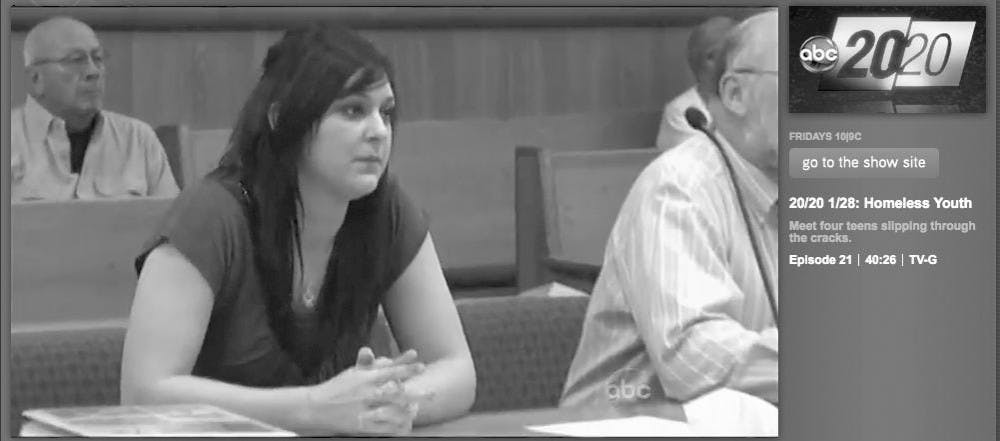(-- The Beacon)
By Natalie Wheeler Staff Writer wheelern12@up.edu
Freshman nursing student Dakota Garza is calm and well-spoken as she recounts her story. Considering her life so far, this is a feat in itself.
"(My mom) has never had a stable home," Garza said. "She always struggled with her own problems, but a lot of it was substance and drug abuse."
At 16, Garza was emancipated from her abusive mother, and as a result, was left without a home. Her story was profiled in an ABC 20/20 television special about teen homelessness on Jan. 28.
"I wasn't sure if I wanted to do it," Garza said about signing with 20/20 to be filmed for one year. "But I was hoping it would help other kids and maybe help me get some scholarships."
Garza was one of four homeless teens profiled in the 20/20 episode. During the filming, Garza went through an emancipation trial and struggled to keep up with her job, bills and school.
"I'd be so overwhelmed with having to pay bills and stuff like that," Garza said. "It was hard – some days I would just wake up, and I wouldn't make it to school."
Garza eventually caught up with her schoolwork, but fending for herself was nothing new.
Garza's father died of a drug overdose when she was 2 years old, and her mother would often ignore her for weeks at a time.
"We would be living together and she just wouldn't talk to me for two weeks," Garza said. "I knew I had to watch out for myself."
Her mother would also decide they were going to leave their home base in Medford, Ore. periodically, especially during the summers. Garza and her mom would then spend the next couple months living in their car or off the charity of other people.
"I remember the first time we began to be homeless when I was about 8 years old," Garza said. "It wasn't as traumatic as people would think because I was with my mother – but looking back on it now, it was definitely a hard time."
It was after another move in the summer before her junior year of high school – this time to San Diego – that Garza reached her limit with her mother and refused to stay with her. She took up residence with her cousins in California, only to realize their intentions.
"They started wanting to take the money I was receiving (from my father's death benefits)," Garza said. "My next move was just about, ‘How do I get out of here?'"
With no one to turn to, Garza decided she needed to seek emancipation from her mother – which could only be done back in Oregon.
"At that time, I just wanted to give up," Garza said. "I felt like it's just easier putting up with the mental, and sometimes physical abuse at home than having to do this on my own."
Garza managed to get money for a Greyhound bus ticket from her friend's mother, and her vice principal drove her to the station.
She made it to Medford, Ore. and began the process for emancipation. But with no family to turn to, she became one of the many homeless youths in Oregon.
"It wasn't easy," Garza said. "I had a lot of Top Ramen."
Garza also worried that if teachers found out about her homelessness, she would be judged.
"I didn't want to be that kid that's looked down upon," Garza said. "I didn't want to be the kid with special circumstances."
The number of Oregon children in circumstances like Garza's is on the rise. According to the Oregon Department of Education, the number of homeless students in the state rose 5.5 percent from the previous year in 2010, the highest ever recorded.
According to social work professor Joseph Gallegos, even though most teen homelessness is a result of an abusive family life, many people assume the teenagers are criminals.
"The stereotype is that these kids are delinquents, that the girls are prostituting themselves and the boys are dealing drugs," Gallegos said. "But that's not always the case."
It certainly wasn't the case with Garza, who stayed mainly at friends' houses. She also started working and, with help from a transitional program, was able to move into her own apartment. She volunteered and managed to receive multiple scholarships, allowing her to study nursing at the University of Portland for free.
"I really want to help people, and I really like the medical aspect," Garza said about her decision to go into nursing.
Garza said school became her escape and goal-setting became her way of pushing through her problems.
"I always had one goal, whether it was emancipation or college or whatever," Garza said. "Every day, I thought about what I could do today that would get me one step closer to that goal."
Now, Garza has a much clearer view of her childhood and of her mother. She still keeps an open line with her – although she does not rely on her for support. Their contact is irregular, but Garza was happy when her mother showed up for her high school graduation.
"That meant a lot, especially after everything that happened," Garza said.
With a new on-campus job making calls in Waldshmidt and a spot in UP's nursing program, Garza is ready to begin her next phase of life.
"I take it one day at a time," Garza said. "The motivation that I have is that I know no one's going to do it for me."








